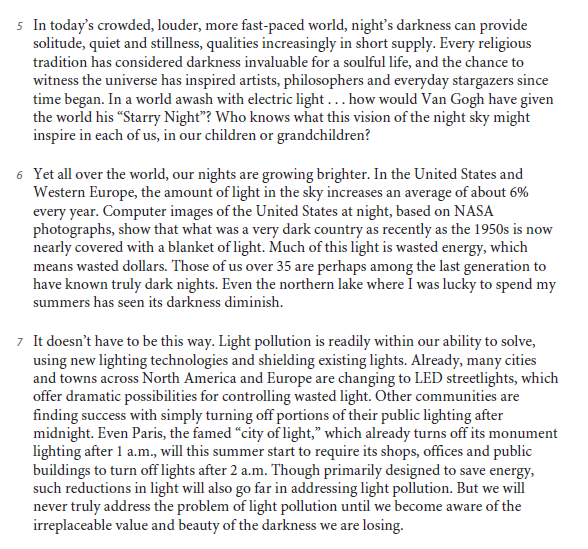摘要:历年来都有很多打算赴美留学的学生,对于如何能更好的考出一个理想的SAT的分数而发愁。除了有好的词汇量基础以外,更多的是多读多看多练。
历年来都有很多打算赴美留学的学生,对于如何能更好的考出一个理想的SAT的分数而发愁。除了有好的词汇量基础以外,更多的是多读多看多练。以下的SAT写作范文来自新航道SAT培训教研组,针对目前还苦于无从下手的考生们希望这些SAT写作范文能够给到你们帮助。
SAT写作真题:


SAT写作题目:
Write an essay in which you explain how Paul Bogard builds an argument to persuade his audience that natural darkness should be preserved. In your essay, analyze how Bogard uses one or more of the features listed in the box above (or features of your own choice) to strengthen the logic and persuasiveness of his argument. Be sure that your analysis focuses on the most relevant features of the passage. Your essay should not explain whether you agree with Bogard’s claims, but rather explain how Bogard builds an argument to persuade his audience.
Paul Bogard, a respected and passionate writer, offers a convincing argument on the importance of allowing more darkness to fill the earth for distinct health and ecological reasons. With light providing as such a huge factor in daily life, we sometimes forget that darkness can have more healing abilities, and allows nature to return to a nonartificial, primitive state. Bogard uses personal observation for credibility, stirring feelings, and startling facts to deliver a powerful argument. Throughout the passage, Bogard remains nostalgic about his childhood: “At my
family’s cabin on a Minnesota lake, I knew woods so dark that my hands disappeared before my eyes. I knew night skies in which meteors left smoky trails across sugary spreads of stars....This winter solstice, as we cheer the days’ gradual movement back toward light, let us also remember the irreplaceable value of darkness.” The description of nature and the stunningly beautiful imagery creates a feeling of deep respect for the darkness. We share in Bogard’s view and as a result, Bogard has undeniable credibility. Bogard knows the power of darkness and through his childhood memories, we lean our ears to listen to him.
Even though credibility makes many appearences throughout the passage, it would have no real meaning without evoking emotion. Bogard strikes the people who disagree with him when he says, “Our bodies need darkness to produce the hormone melatonin, which keeps certain cancers from developing and our bodies need darkness for sleep. Sleep disorders have been linked to diabetes, obesity, cardiovascular disease and depression, and recent research suggests one main cause of ‘short sleep’ is ‘long light’.” Bogard’s statement dissolves any doubt, but builds up new feeling. We finally see the true importance of allowing our world to temporarily succumb to darkness. Through the emotion Bogard evokes, we suddenly feel defensive in preserving the darkness for the sake of our mental and physical health. Bogard even makes us think about the future generations: “In a world awash with electric light...how would Van Gogh have given the world his ‘starry night’? Who knows what this vision of the night sky must inspire in each of us, in our children or grandchildren?”
In order to achieve proper credibility and stir emotion, undeniable facts must reside in passage. Bogard has completed his research, and uses it to further his case: “The rest of the world depends on darkness as well, including nocturnal and crepuscular species of birds, insects, mammals, fish, and reptiles. Some examples are well known—the 400 species of birds that migrate at night in North America, the sea turtles that come to lay their eggs—and some are not, such as the bats that save American farmers billions in pest control and the moths that pollinate 80% of the world’s flora.” Using the facts about animals, Bogard extends the argument beyond humans, allowing us to see that darkness does not only have an impact on us, but all of nature. Bogard then says, “In the United States and Western Europe, the amount of light in the sky increases an average of about 6% every year.... Much of this light is wasted energy, which means wasted dollars. Those of us over 35 are perhaps among the last generation to have known truly dark nights.” However, Bogard extends the facts to offer various solutions to wasted and excessive light, such as changing LED streetlights and reducing the use of lights in public buildings and homes during the night. Bogard builds up our world, and then breaks it down in our minds with his writing: “Simply put, without darkness, Earth’s ecology would collapse....”
We can still save our world according to Bogard. We must see the strength and beauty in the darkness, and remember how our world survived without lights. Light can be acceptable, but too much of it can prove worse than permanent darkness.
2016SAT真题下载:2016年10月1日亚太SAT真题PDF下载、2016年10月1日北美SAT真题及答案下载、2016年5月亚太SAT真题及答案下载、2016年5月北美SAT真题及答案下载
上一篇:新SAT写作真题与范文(四)
下一篇:新SAT写作真题与范文(三)
免费领取最新剑桥雅思、TPO、SAT真题、百人留学备考群,名师答疑,助教监督,分享最新资讯,领取独家资料。
方法1:扫码添加新航道老师

微信号:shnc_2018
方法2:留下表单信息,老师会及时与您联系
| 课程名称 | 班级人数 | 课时 | 学费 | 报名 |
|---|---|---|---|---|
| SAT圣诞归国班 | 8-10人 | 96课时 | ¥15800 | 在线咨询 |
| SAT考前模考冲刺班 | 40课时 | ¥3800 | 在线咨询 | |
| SAT模考刷题班 | 不限 | 4天 | ¥5800 | 在线咨询 |
| 课程名称 | 班级人数 | 课时 | 学费 | 报名 |
|---|---|---|---|---|
| SAT强化班(3-6人,走读) | 3-6人 | 64课时 | ¥31800 | 在线咨询 |
| SAT冲刺班(3-6人.走读) | 3-6人 | 32课时 | ¥18800 | 在线咨询 |
| SAT精英班(3-6人,争1500分) | 3-6人 | 48课时 | ¥16800 | 在线咨询 |
| SAT预备班(3-6人,走读) | 3-6人 | 32课时 | ¥16800 | 在线咨询 |
| SAT基础班(3-6人,走读) | 3-6人 | 64课时 | ¥30800 | 在线咨询 |
| 课程名称 | 班级人数 | 课时 | 学费 | 报名 |
|---|---|---|---|---|
| ACT强化托管班(6-8人,走读) | 3-6人 | 64 | ¥21800 | 在线咨询 |
| ACT冲刺托管班(6-8人,走读) | 3-6人 | 64 | ¥11800 | 在线咨询 |
| 课程名称 | 班级人数 | 课时 | 学费 | 报名 |
|---|---|---|---|---|
| SAT一对一 | 1 | 按需定制 | ¥1280元 | 在线咨询 |
| ACT一对一 | 1 | 按需定制 | ¥980元 | 在线咨询 |
免责声明
1、如转载本网原创文章,请表明出处;
2、本网转载媒体稿件旨在传播更多有益信息,并不代表同意该观点,本网不承担稿件侵权行为的连带责任;
3、如本网转载稿、资料分享涉及版权等问题,请作者见稿后速与新航道联系(电话:021-64380066),我们会第一时间删除。
地址:徐汇区文定路209号宝地文定商务中心1楼
乘车路线:地铁1/4号线上海体育馆、3/9号线宜山路站、11号线上海游泳馆站
总部地址:北京市海淀区中关村大街28-1号6层601 集团客服电话:400-097-9266 总部:北京新航道教育文化发展有限责任公司
Copyright © www.xhd.cn All Rights Reserved 京ICP备05069206


 微信公众号
微信公众号
 微信社群
微信社群